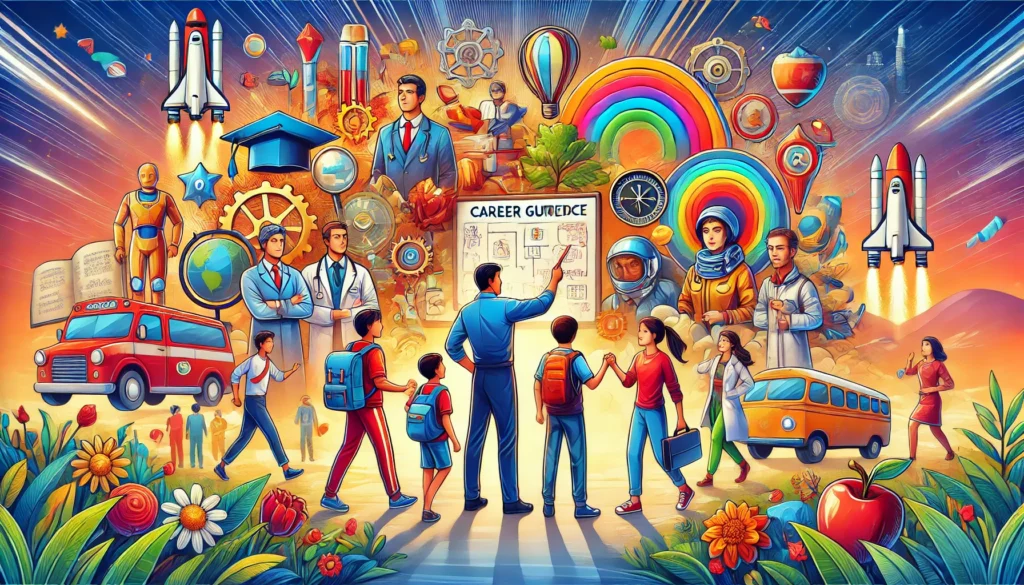
Career Guidance for 1st to 10th Standard Students: Building a Strong Foundation
Choosing the right career is one of the most important decisions in life. Many people believe career guidance is necessary only after 10th or 12th standard, but in reality, career awareness should start from an early age. When students get the right exposure, motivation, and support, they can explore their strengths and work toward a bright future with confidence.
Let’s explore how career guidance can help 1st to 10th standard students and how parents and teachers can support them.
Why Career Guidance from an Early Age?
Early career awareness helps students explore different fields and choose the right path.
It helps them develop skills that will be useful in their future careers.
It reduces confusion and stress about career choices later in life.
Students become more focused and motivated when they know their interests.
How to Identify a Student’s Strengths and Interests?
Every child has unique talents, and identifying them early can help in career planning. Here are some ways to do it:
Observe which subjects they enjoy the most.
Encourage them to participate in different activities like sports, music, arts, coding, and debate.
Ask them what excites them—Do they love solving puzzles? Do they enjoy writing stories? Do they like experimenting in science?
Take help from teachers and mentors to understand their strengths.
Career Paths Based on Interests
It’s important to introduce students to different career options based on their interests:
Science & Technology: Engineering, Medicine, Robotics, AI, Space Science, Environmental Science.
Mathematics & Logical Thinking: Chartered Accountancy, Data Science, Actuarial Science, Banking.
Arts & Creativity: Graphic Designing, Animation, Architecture, Writing, Fashion Designing, Music.
Social Sciences & Humanities: Civil Services, Law, Teaching, Journalism, Psychology.
Business & Management: Entrepreneurship, Marketing, Sales, Human Resource Management.
Sports & Fitness: Professional Sports, Fitness Training, Coaching, Sports Journalism.
Essential Skills for Future Success
No matter which career path a student chooses, developing key skills is important:
Communication skills – Helps in expressing thoughts and ideas clearly.
Problem-solving ability – Builds confidence in tackling challenges.
Time management – Helps in balancing studies and personal interests.
Creativity & innovation – Essential for success in any field.
Leadership & teamwork – Develops confidence and decision-making skills.
The Role of Parents and Teachers in Career Guidance
Parents and teachers play a vital role in shaping a student’s future:
Encourage students to explore their interests instead of forcing a particular career.
Introduce them to different career options through books, educational videos, and field visits.
Help them develop practical skills along with academic knowledge.
Motivate them to work hard and not be afraid of failures, as failures are a part of learning.
Choosing the Right Stream After 10th Standard
After 10th standard, students have to select a stream—Science, Commerce, or Arts. The choice should be based on their interests and future career goals:
Science: Best for those interested in Engineering, Medicine, Research, or Technology.
Commerce: Ideal for students interested in Finance, Business, Management, or Economics.
Arts: Suitable for students who enjoy Creativity, Writing, Law, Psychology, or Social Sciences.
It’s important to choose a stream based on passion rather than peer pressure or trends.
Common Myths About Careers
Many misconceptions exist about career choices. Let’s clear some of them:
“Only Science students have a good future” – Not true! Every field has great opportunities.
“Marks are the only thing that matters” – Skills and practical knowledge are equally important.
“You must choose a career early and stick to it” – Interests can evolve, and career paths can change.
“Success depends only on talent” – Hard work, consistency, and passion matter more than just natural talent.
Sanatan Dharma Guidance for Career and Education
In Sanatan Dharma, knowledge (Vidya) is considered the greatest wealth. The Bhagavad Gita (2.50) states: “A wise person performs duties with skill and intelligence.” The ancient Gurukul system focused on practical learning, self-discipline, and values, which are still relevant today. Career success is not just about earning money—it is about fulfilling one’s Dharma (duty) by using talents wisely and contributing to society. Coaching and career guidance, when done ethically, help students find the right path in alignment with their inner strengths and purpose.
Conclusion: Career Guidance for a Bright Future
Choosing a career is not a one-time decision; it is a journey. The key to success is self-awareness, proper guidance, and continuous learning.
Parents and teachers must encourage students to explore, develop skills, and follow their passions. With the right support, every child can build a bright and successful future!
At Jignesh Academy, we not only help students excel in academics but also guide them toward the right career choices. After all, the right foundation today leads to a successful tomorrow!
source: https://www.jigneshacademy.in.net/career-guidance/